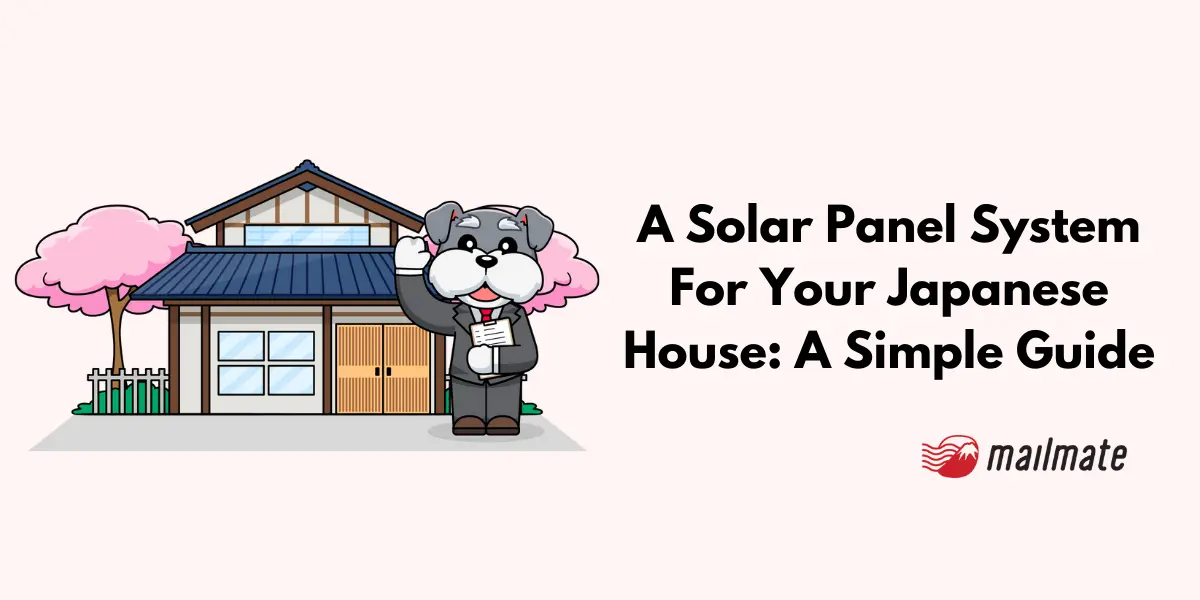Solar Panel Installation For Your Japanese House: A Guide

New Tokyo regulations, effective April 2025, mandate that all newly built houses be equipped with solar panels to meet a net zero CO2 emission goal.
If you're planning to get a new house or are considering getting solar panels, this guide will provide you with the essential information to help you understand solar installations and how to manage a solar energy system in Japan.
Why are solar panels necessary in Japan?
As the world moves towards a net zero CO2 emission goal by 2025, the Tokyo Metropolitan Government (TMG) formed The Carbon Half Plan to halve greenhouse gas emissions by 2023. Part of this initiative involves solar panels to promote renewable energy.
Do I need solar panels in Japan?
All new detached houses in Tokyo after April 2025 are required to have solar panels installed.
However, if you are purchasing a property in a different part of Japan, it's possible that solar panels may not be mandated in the region.
Consult with an English-speaking real estate agent or your local municipality about whether the city or prefecture in question has incentives for solar installations.
Many regions offer subsidies, tax incentives, and rebate programs to help defray the cost of solar installation.
What type of solar panels are there in Japan?
There are two types of solar panel systems in Japan:
Domestic Systems (under 10kW): Uses the electricity that was generated and sells the excess.
Commercial Systems (over 10kW): All generated electricity is sold and can not be used for personal consumption.
Many houses will use the domestic system, while businesses will use the commercial solar panel system.
How do I install solar panels for my house in Japan?
Installing a solar panel is fairly simple once you have the needed information.
While people's personal experience varies, here are some general steps to help you with the solar panel installation process.
Step 1: Research local regulations and incentives
Check local building codes and zoning laws about the rules for installing solar panels on your property.
We recommend contacting your local ward office for detailed information regarding incentives and tax breaks when installing solar panels.
Step 2: Obtain quotes and choose a contractor
There are many solar panel installation companies in Japan. The most popular solar companies are the following:
QCELLS
Canadian Solar (カナディアン・ソーラー)
Next Energy (ネクストエナジー)
Get quotes from different companies to compare the prices and their services.
Step 3: Financing the system
Many solar panel companies offer financing options, including loans, leases, or power purchase agreements (PPAs).
Calculate the long-term savings and payback period to understand the financial burden and future benefits.
Step 4: System design and installation

There are four types of roof shapes in Japan:
切妻 (kiri dzuma)
寄棟 (yose mune)
入母屋 (iri moya)
片流れ屋根 (katanagare yane)
Each roof will need a unique panel design that the contractor will draw up for your home's needs.
The contractor will handle the permits from local authorities. Depending on the system's size, complexity, and how many solar panels your system will require—installation will take from a few days to a couple of weeks.
Step 5: Inspection, connection, and activation
Once the installation is done, the local authorities will inspect it to ensure it complies with the electrical codes. If the system is connected to the grid, the process may include installing a device to measure the electrical flow in and out of your house.
Once approved, your contractor will activate the system, which will begin generating electricity.
Step 6: Maintenance
Regular maintenance is needed for an efficient solar panel system, including cleaning and checking the inverters and solar panel mounts from time to time.
Some solar companies will offer solar panel maintenance as part of your total cost or as an additional service.
What does a solar panel system involve?

A breakdown of a solar panel system
A complete solar system installation includes:
Solar panels (solar cell module): generate electricity when sunlight hits it
Frame: contains the solar panels
Power conditioner: adjusts the voltage for home use
Power monitor: displays power status and usage
Dedicated cables: for the solar panel systems
How much does a solar panel cost in Japan?
Three major factors affect the cost of solar panels:
Manufacturer: Different companies sell solar panels with varying amounts of kilowatts (kW).
The roof: the price increases proportionately to the number of solar panels you purchase and the type of roof and subsequent mounting structure required. Additionally, the shape, size, and material will also affect the overall costs of installing solar panels.
Subsidies: The third and final factor is subsidies. The government encourages new detached houses to install solar panels, and subsidies greatly help reduce the costs of installing solar panels.
Currently, the average price for a solar panel in Japan ranges from 200,000 to 400,000 yen per kilowatt (kW).
Are there subsidies for installing solar panels in Japan?
The Tokyo Metropolitan Government is actively promoting the adoption of solar power generation through various incentives to support residents and builders in transitioning to a decarbonized society.
These incentives are designed to reduce greenhouse gas emissions and increase energy efficiency across the city.
Here's an outline of the key governmental incentives available for the installation of solar panels:
1. Subsidy expansions for zero-emission houses
To help create zero-emission houses, both national and local governments have made solar panel subsidies to encourage the installation of solar panel systems.
a) National subsidies for solar panels in Japan
The Japanese government has created the following subsidies for residents that are shifting toward solar power systems:
Eco-home childcare support project:
This subsidy is for young couples or families with young children who want energy-efficient homes; the fund will contribute up to 600,000 yen for renovations and 64,000 yen for storage batteries.
DR subsidy
This subsidy focuses on adjusting electricity supply and demand through storage batteries and provides 37,000 yen/kW for residential storage batteries, covering up to 1/3 of eligible expenses (max 600,000 yen).
DER subsidy
This subsidy helps manage solar power, EVs, air conditioners, and water heaters for homes and buildings.
ZEH subsidy
Additionally, the following chart outlines the ZEH補助金, ZEH Subsidy:
Project |
Subsidy amount |
|---|---|
ZEH support project |
550,000 yen/unit |
ZEH support project ZEH+ |
1 million yen/unit |
Next-generation ZEH+ (custom-built housing) demonstration project |
1 million yen/unit |
Next-generation HEMS demonstration project |
1,120,000 yen/unit |
Each project has an additional subsidy for eligible expenses. On average, homeowners can expect an approximation of the following:
For newly built homes: up to 360,000 yen (120,000 yen/kW)
For existing homes: up to 450,000 yen (150,000 yen /kW)
b) Local government subsidies
Local subsidies for solar panels in Japan varies throughout municipalities. Here are some main subsidies in Tokyo:
Tokyo: Offers up to 950,000 yen for storage batteries under specific conditions, with an additional fixed subsidy of 100,000 yen for solar systems.
Adachi-ku, Tokyo: Covers 1/3 of eligible expenses for residential storage batteries (max 50,000 yen)
Saitama: has subsidies that cover half of eligible expenses for storage batteries under their Super City Project. Otherwise, covers 1/3 of expenses (max 120,000 yen).
Chiba City: provides 70,000 yen for residential storage batteries as a fixed-rate subsidy.
2. Tax incentives and deductions
Significant tax reductions or complete exemptions exist for those who meet the requirements as part of Tokyo's ZEH project.
These incentives include exemptions from part or all of the taxes normally due on acquiring real estate, making the initial costs of installing solar panels more affordable for property developers and home buyers.
Here is an overall summary of the deduction amount for energy-saving renovation involving solar panels.
Construction Type |
Deductible Limit |
Deduction Rate |
Maximum Deduction Amount
(required construction + other construction total) |
|---|---|---|---|
Energy-saving renovation work |
3.5 million yen |
10% |
625,000 yen (675,000 yen) |
|
Long-term quality housing
(earthquake resistance or energy saving + earthquake durability) |
6 million yen |
10% |
625,000 yen (675,000 yen) |
|
Long-term quality housing
(earthquake resistance + energy saving + durability) |
3.5 million yen |
10% |
750,000 yen (800,000 yen) |
3. Zero emission points
Tokyo extended its Zero Emission Points Program to encourage energy-efficient appliances. When Tokyo residents purchase energy-efficient home appliances, they receive points that can be exchanged for gift items.
For example, switching to a refrigerator that saves a certain amount of energy can give you points worth up to 21,000 yen.
4. Support for households without solar panel capability
The Tokyo government understands that not all buildings can install solar panels due to structural or regulatory limits.
Thus, the government is facilitating access to renewable energy through various means, such as helping to negotiate lower rates, facilitating contracts with renewable energy providers, and supporting energy distribution.
5. For housing-related organizations
The Tokyo government is looking for ways to partner with housing-related organizations, such as residential apartments, to promote energy efficiency and renewable energy as part of the broader housing industry, making it more feasible for Tokyo residents to install solar panels in apartment buildings (i.e., buildings that aren't a detached house).
Frequently asked questions
How many kW should I install in my home?
5kW is the national average for installing solar panels in a home in Japan. The amount varies depending on the region and the property's roof size. The maximum for a household is 10kW.
Do I need a storage battery with solar panels?
While not necessary, storage batteries are highly recommended. Solar panels create electricity, but they don't store it. So, having a storage battery is beneficial at night or when solar production is low.
Are solar panels actually worth it?
In the long run, yes. The Tokyo Metropolitan Environment Bureau estimates that installing solar power can contribute to saving about 7,700 yen monthly on your electricity bill in Tokyo.
In closing
Need help with contacting a Japanese solar company? Or getting a quote for your property?
Why not try MailMate's bilingual property management services?
MailMate simplifies property management logistics with services such as the following:
Tax Representative for Real Estate Taxes
Domestic Point of Contact for Properties
Property Management and Association Bill-pay & Local Liaison
Utility Set-up, Bill-pay, & Local Liaison
Fiber Optic Internet (10 Gbps)
Home Insurance
Akiya, Property Help & Support Hotline
Property Visit & Check-in
One Time Set-up & Filing

Founded in 2019, MailMate has simplified property ownership for foreigners living abroad and is an increasingly popular option recommended by users and well-known industry figures.

Spending too long figuring out your Japanese mail?
Virtual mail + translation services start at 3800 per month. 30-day money-back guarantee.

